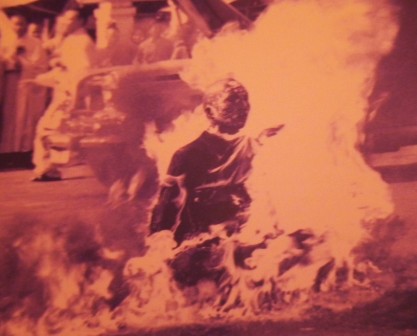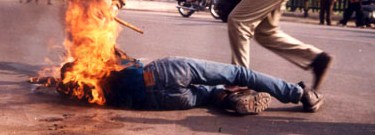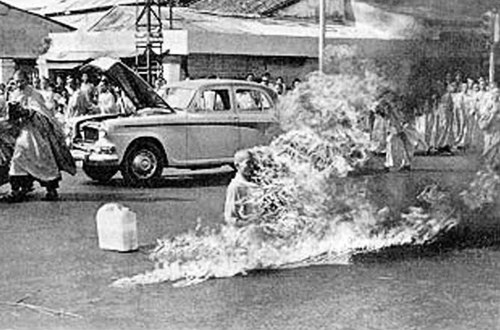Self-Immolation: The Power Of Suicide As Political Protest

NEWS JUNKIE POST
Jan 17, 2011 at 9:53 pmIn the last few days, in the Middle-East, a few men have embraced self-immolation as the ultimate form of political protest, following the example of 26-year-old Mohammed Bouazizi. Bouazizi torched himself when police prevented him from selling fruits and vegetables. The case of Bouazizi, who later died from his wounds, was a critical catalyst in unleashing the wave of protests in Tunisia which have just toppled the authoritarian regime of Ben Ali.
In Algeria, at least four attempted public suicide, all in protest over unemployment, food prices and scarcity of housing, occurred this week using the same method than the one used by Bouazizi. On Monday, a man set himself on fire outside Egypt’s parliament, and another one torched himself in front of the presidential palace in Mauritania in an apparent replay of Bouazizi’s self-immolation. All the men in question, witnessing the current success of the Tunisian revolution, are obviously trying to become martyrs on behalf of their own people, and to graphically illustrate the people’s desperation and suffering.
Egyptians are voicing similar grievances than Tunisians in terms of economic hardship, corruption, social injustice, and the lack of free speech. The Iron-fist regime of Mubarak has kept a lid on any social progress and freedom for decades. To secure his grip on power, Mubarak has kept an emergency law in place for 30 years. Further, to add insult to injury, half of Egypt’s 80 million people live below the poverty line, which is at an incredibly low level of two dollars a day.
It is somewhat reductive to view these men just as Bouazizi’s copycats. It is disturbing, but it is bigger and deeper than that. What they are doing is a political act. By torching themselves, they are trying to make Tunisia’s Jasmine Revolution spread like wild fire through the region, and are acting as symbol of the people’s common misery. In other words, their martyrdom is not really an act of personal desperation like most suicides, but it has a collective value in the desire to become a catalyst for change. While suicide is one of the most despicable form of political action, whatever the “reasons” may be, when it is committed by suicide-bombers, the motivation and moral predicament of public suicide by self-immolation belong to a completely different realm. Even so it is a violent act, it is not violence directed at others, and it can have peaceful implications for the common good.
Two historical examples should be discussed to comprehend the paradox of self-immolation in the context of a reflection on possible justification and effectiveness of such extreme acts. Both episodes of self-immolation took place during the Vietnam war, one in Vietnam and another one in the United States. On June 11, 1963 in Saigon, a Buddhist monk, Thich Quang Duc (see 3RD photographs) immolated himself in the middle of a busy intersection. A crowd of Buddhist monks watched as the 73-year-old lit a match, and over the course of a few moments, burned to death while he remained seated perfectly still in the lotus position.
“Flames were coming from a human being; his body was slowly withering and shriveling up, his head blackening and charring. In the air was the smell of burning flesh; human being burn surprisingly quickly. As he burned, he never moved a muscle, never uttered a sound,” wrote an emotional David Halberstam who was filing daily reports for the New York Times from Vietnam. The event, and the photographs taken by Malcolm Brown (photo 3), was a catalyst in changing the course of the war by its deep impact on our global consciousness. The act of self-immolation by the Vietnamese monk was followed a couple of years later by Norman Morrison.
On November 2ND 1965, Norman Morrison -a Quaker and anti-war activist- committed suicide by dousing himself with kerosene, and setting himself on fire in front of the Pentagon. The self-immolation of Morrison took place just bellow Secretary of Defense McNamara’s office. Morrison’s public suicide was done as a tribute to the innocent men, women and children of Vietnam, and to protest the war. Norman Morrison’s self-immolation shocked McNamara and America, and it had a significant role to play in turning US public opinion against the war.
Today is Martin Luther King’s day, and it could not be a better time to reflect on violence and political action. Dr. King was a tireless advocate of peaceful political protest, but can self-immolation be categorized as a form of violence considering it is the ultimate sacrifice used as a catalyst for a greater collective consciousness? And further, is non-violent protest alone effective enough to force social or political changes in oppressive societies maintaining a tyrannical order by a police or military apparatus?
Related Articles
- January 24, 2011 Tunisia, WikiLeaks And Food Crisis: Forces For A Global Revolution
- January 30, 2011 Arab People: From Powerless To Proud
- January 14, 2011 Tunisia: Will Ben Ali’s Resignation Inspire Revolutions In Other Arab Countries?
- January 16, 2011 Tunisia’s Jasmine Revolution: Spreading Fear Among Arab Dictators
- January 29, 2012 Has Occupy Forgotten Why?
- February 13, 2011 Global Revolution: Will the Many Finally Triumph Over the Few?















5 Responses to Self-Immolation: The Power Of Suicide As Political Protest
You must be logged in to post a comment Login